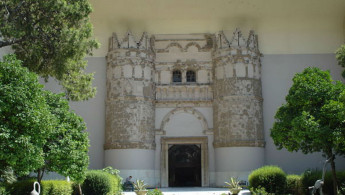Syria reopens Damascus antiquities museum
Syria reopened a wing of the capital's famed antiquities museum on Sunday after the deadly war caused it to close for six years.
Officials swung open the large wooden door of the building in central Damascus for the first time since 2012.
On display were "some of the artefacts that used to be exhibited at the National Museum dating... from prehistory to the Islamic era," antiquities official Ahmad Deeb said.
Authorities were working "to prepare the whole museum in the coming period" to be reopened, he said.
The Damascus museum, founded in 1920, was closed one year into the civil war as the then national head of antiquities took action to protect its artefacts from the conflict.
Its gardens, however, remained open to the public, even as rockets intermittently hit Damascus from the rebel bastion of Eastern Ghouta, northeast of the capital.
Syria is home to more than 700 archeological sites, many of which have been destroyed, damaged or looted since the start of the war.
All warring sides have been accused of looting artifacts during the conflict, from both major archeological sites and the country's museums.
The most famous include the ancient city of Palmyra, a UNESCO-listed heritage site overrun by the Islamic State group until the Russia-backed army retook it last year.
From 2012 onwards, the museums authority stored some 300,000 items and thousands of manuscripts from around the country at secret locations protected from fires, shelling and floods.
More than seven years into the conflict, President Bashar Assad's regime has secured the capital, after expelling rebels and from its outskirts earlier this year with Russian military support in a devastatingly brutal offensive.
Assad's forces are now in control of around two-thirds of the country.
The Syrian conflict began when the Baath regime, in power since 1963 and led by President Bashar al-Assad, responded with military force to peaceful protests demanding democratic reforms during the Arab Spring wave of uprisings, triggering an armed rebellion fuelled by mass defections from the Syrian army.
Hundreds of thousands of civilians have been killed in the war, mostly by the regime and its powerful allies, and millions have been displaced both inside and outside of Syria.
The brutal tactics pursued mainly by the regime, which have included the use of chemical weapons, sieges, mass executions and torture against civilians have led to war crimes investigations.





 Follow the Middle East's top stories in English at The New Arab on Google News
Follow the Middle East's top stories in English at The New Arab on Google News


